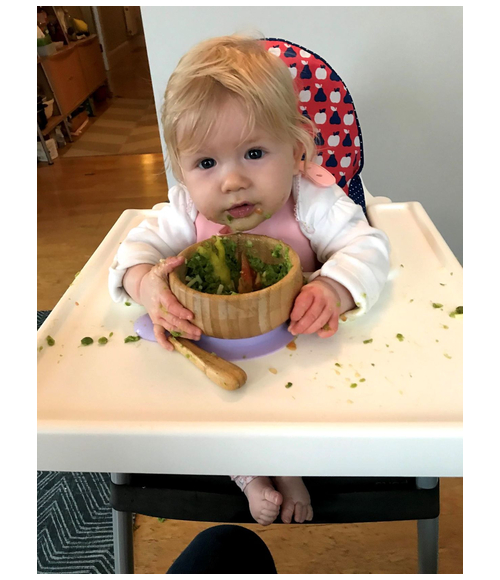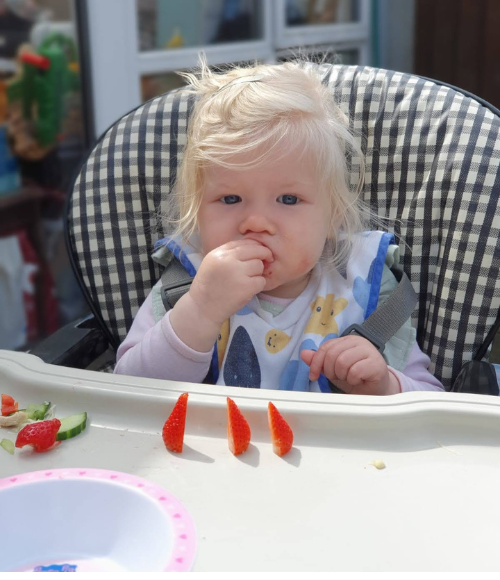Weaning - My Top Tips!
May brings us National Weaning Week here in the UK.
If you and your baby (or babies!) are about to start your weaning journey then read on for some of my tried and tested top tips!
A vegetables first approach…
Babies are born with a preference for sweet tastes and so it is important to offer a variety of flavours from the beginning. Bitter foods such as broccoli and sour foods such as rhubarb should be offered regularly (for familiarity) rather than avoided. This will help baby develop their taste for a variety of different foods and flavours.
Babies are expressive…
Don’t be put off if baby pulls a funny face when trying a new food. Quite often it’s an expression of tasting something different rather than a dislike and you’ll notice they often go back for more!
If baby does refuse a food, don’t be discouraged. Familiarity is key and it is well documented that it can take 10-15 tastes of a food before it is accepted!
Environment is important…
Aim for a calm setting where you can take time, relax, smile, embrace the mess and enjoy the process! Weaning can be frustrating but babies are very intuitive and will pick up on any anxieties. Be a role-model, if you can, and eat at the table with baby. They love to see you eat and will learn their eating habits from you!
Don’t compare…
When it comes to weaning (as with most things) every baby and every day is different. What is loved one day may be rejected the next. Don’t be disheartened, weaning is a journey that takes many months (leading into years!) of practice, trial, error and success. Accept the days when things just don’t work out and cheer those wins!
Baby Led Weaning (BLW) vs. Purée… Or, combine the two!
There are pros and cons to both methods and it’s totally personal preference as to which you wish to try with your baby.
Purée generally gives more control to the giver over: (a) what ingredients go into the purée; (b) how much is eaten; and (c) less mess. It can also encourage independent spoon-feeding skills.
BLW allows baby to interact with soft finger foods. This is inevitably messy and it doesn’t often end with much food being eaten but it is a great way for baby to see, touch and explore a food in its natural (albeit cooked) state. It encourages baby to use their fine motor skills and they can practice the motions of biting and chewing.
Choking hazards…
It is important to be aware of potential choking hazards during the weaning process as babies cannot gauge how big a bite should be.
Cooked foods should be soft and mushy (a good way to measure is if you can squash it easily between your finger and thumb). It should be soft enough for baby to mush with their tongue and gums.
Grated is an easy way to offer a lot of raw foods such as carrot and apple. You can use them as an ingredient or topping or alternatively offer them on the side for baby to practice picking up with their fingers.
Foods such as grapes and blueberries should be chopped into quarters (or smaller) so that if they are swallowed whole they will not get lodged in baby’s throat.
When offering nuts to baby it is always best to grind them up to a coarse powder or use a nut butter.
Allergens…
These are some of the most common food-based allergies in the UK:
- Eggs
- Nuts (e.g. peanuts, walnuts, cashews)
[it is best to introduce nut varieties one at a time as a person can be allergic to one type but not others] - Dairy produce
- Fish
- Shellfish, Molluscs
- Wheat, Gluten
- Soya
- Mustard
- Celery
- Sesame
Always be alert when offering these to baby and only introduce one at a time (e.g. do not offer eggs and peanuts, for the first time, on the same day). It is also best practice to leave at least 3 days between offering allergens for the first time in case of any delayed reactions.
If baby shows signs of immediate distress / severe symptoms (e.g. swelling) you must call 999.
If baby develops moderate or mild symptoms call 111 for advice.
Key Nutrients…
Babies get most of their nutrient needs met through pregnancy (via the placenta) then from breast or formula milk. Throughout the weaning process, baby tends to drink less milk and it is therefore important to introduce nutrients through food, including:
- A variety of vegetables and fruits
- Carbohydrates (e.g. potatoes, oats, pasta)
- Proteins (e.g. fish, meat, eggs, beans, lentils, pulses)
- Fats (found in dairy, fish, oils, nuts, avocado)
- Iron (found in red meat, lentils, eggs, beans, nuts and fortified foods)
- Omega-3 (found in oily fish, flaxseed, walnuts and enriched eggs)
It is encouraged to avoid any added salts or sugars in baby’s diet to ensure optimal health. Please check labels of store-bought foods and enquire at restaurants, if necessary.
I offer personalised support for weaning journeys. If you would like to know more then please get in touch!






mint pharmaceuticals tadalafil
mint pharmaceuticals tadalafil
zoloft generic brand
zoloft generic brand
metronidazole sneezing
metronidazole sneezing
gabapentin myositis
gabapentin myositis
difference between lexapro and cymbalta
difference between lexapro and cymbalta
best time of day to take lexapro
best time of day to take lexapro
keflex cover mrsa
keflex cover mrsa
best female viagra 2018
best female viagra 2018
does cephalexin make you sleepy?
does cephalexin make you sleepy?
fluoxetine qtc prolongation
fluoxetine qtc prolongation
does duloxetine cause erectile dysfunction
does duloxetine cause erectile dysfunction
escitalopram-oxalate side effects
escitalopram-oxalate side effects
what should i avoid while taking ciprofloxacin
what should i avoid while taking ciprofloxacin
cephalexin 500mg capsule for sinus infection
cephalexin 500mg capsule for sinus infection
how to take bactrim
how to take bactrim
can dogs take bactrim
can dogs take bactrim
neurontin and birth defects
neurontin and birth defects
can amoxicillin treat trichomoniasis
can amoxicillin treat trichomoniasis
side effects of ezetimibe tablets
side effects of ezetimibe tablets
how long will i have to take flomax
how long will i have to take flomax
diclofenac sodium ophthalmic solution
diclofenac sodium ophthalmic solution
depakote sprinkles side effects
depakote sprinkles side effects
flexeril and xanax
flexeril and xanax
diltiazem antidote
diltiazem antidote
how long do side effects of augmentin last
how long do side effects of augmentin last
ddavp pdf
ddavp pdf
does effexor cause weight loss
does effexor cause weight loss
cozaar tablets
cozaar tablets
citalopram first day
citalopram first day
contrave withdrawal
contrave withdrawal
aripiprazole package insert
aripiprazole package insert
aspirin ibuprofen
aspirin ibuprofen
amitriptyline withdrawal symptoms
amitriptyline withdrawal symptoms
allopurinol cancer
allopurinol cancer
what does augmentin treat
what does augmentin treat
baclofen addictive
baclofen addictive
how long does ashwagandha take to work
how long does ashwagandha take to work
celecoxib otc
celecoxib otc
bupropion side effects hair loss
bupropion side effects hair loss
citalopram celexa
citalopram celexa
celebrex manufacturer
celebrex manufacturer
robaxin 750 side effects
robaxin 750 side effects
semaglutide 7 mg
semaglutide 7 mg
actos surrealistas
actos surrealistas
acarbose postprandial
acarbose postprandial
protonix alternative
protonix alternative
abilify lawsuit 2022
abilify lawsuit 2022
remeron for panic attacks
remeron for panic attacks
repaglinide and diabetes prevention
repaglinide and diabetes prevention
tamsulosin hydrochloride msds
tamsulosin hydrochloride msds
what does tizanidine look like
what does tizanidine look like
stromectol without prescription
stromectol without prescription
spironolactone 100
spironolactone 100
sitagliptin 25 tablet
sitagliptin 25 tablet
does voltaren gel interact with blue emu cream
does voltaren gel interact with blue emu cream
synthroid constipation
synthroid constipation
venlafaxine and weed
venlafaxine and weed
levitra 20mg online
levitra 20mg online
side effects of cialis tadalafil
side effects of cialis tadalafil
cialis online pills
cialis online pills
sildenafil cost
sildenafil cost
aciclovir tablets pharmacy
aciclovir tablets pharmacy
buy levitra usa
buy levitra usa
sildenafil vs sildenafil citrate
sildenafil vs sildenafil citrate
medical pharmacy south
medical pharmacy south
generic tadalafil 2018
generic tadalafil 2018
sildenafil prices in canada
sildenafil prices in canada
is generic tadalafil as good as cialis
is generic tadalafil as good as cialis
buy ivermectin stromectol
buy ivermectin stromectol
ivermectin 4 tablets price
ivermectin 4 tablets price
cheap vardenafil tablets
cheap vardenafil tablets
cost of ivermectin
cost of ivermectin
generic viagra online 100mg
generic viagra online 100mg
ivermectin syrup
ivermectin syrup
ivermectin 5 mg price
ivermectin 5 mg price
ivermectin cost in usa
ivermectin cost in usa
vardenafil doses
vardenafil doses
gabapentin side effects dogs
gabapentin side effects dogs
trimox 500 mg
trimox 500 mg
gabapentin and pregabalin
gabapentin and pregabalin
prednisone 20mg dosage
prednisone 20mg dosage
diseases treated by ampicillin
diseases treated by ampicillin
ciprofloxacin / dexamethasone ear drops how to use
ciprofloxacin / dexamethasone ear drops how to use
how long does cephalexin take to work
how long does cephalexin take to work
lisinopril contraindications
lisinopril contraindications
myocarditis + hypersensitivity + provigil
myocarditis + hypersensitivity + provigil
what’s valacyclovir used for
what’s valacyclovir used for
metformin during pregnancy
metformin during pregnancy
does doxycycline treat sinus infection
does doxycycline treat sinus infection
keflex dosage for uti
keflex dosage for uti
how long does it take for amoxicillin to work
how long does it take for amoxicillin to work
trazodone drug test
trazodone drug test
nolvadex dosage bodybuilding
nolvadex dosage bodybuilding
how long does vardenafil last in body
how long does vardenafil last in body
levitra side effects vs viagra
levitra side effects vs viagra
does ageless male work like viagra
does ageless male work like viagra
online pharmacy review xanax
online pharmacy review xanax
tadalafil warnings
tadalafil warnings
sildenafil warnings
sildenafil warnings
sildenafil price cvs
sildenafil price cvs
sildenafil time to work
sildenafil time to work
que es sildenafil
que es sildenafil
side effects of sildenafil
side effects of sildenafil
overnight pharmacy 4u viagra
overnight pharmacy 4u viagra
difference between viagra and levitra
difference between viagra and levitra
tadalafil 60 mg vidalista
tadalafil 60 mg vidalista
how to take cialis 20mg
how to take cialis 20mg
levitra online us
levitra online us
reliable rx pharmacy coupon code
reliable rx pharmacy coupon code
sildenafil 60mg
sildenafil 60mg
buy brand levitra online
buy brand levitra online
levitra walmart $9
levitra walmart $9
para que sirve tadalafil 5 mg
para que sirve tadalafil 5 mg
legitimate online pharmacy tramadol
legitimate online pharmacy tramadol
domperidone inhouse pharmacy
domperidone inhouse pharmacy
oxycodone india pharmacy
oxycodone india pharmacy
liquid vardenafil dosage
liquid vardenafil dosage
can you drink alcohol with sildenafil
can you drink alcohol with sildenafil
does cialis increase blood flow everywhere
does cialis increase blood flow everywhere
sildenafil brand name
sildenafil brand name
mexican pharmacy azithromycin
mexican pharmacy azithromycin
tadalafil drug interactions
tadalafil drug interactions
online pharmacy c o d
online pharmacy c o d
uk pharmacy online codeine
uk pharmacy online codeine
natural tadalafil
natural tadalafil
viagra uk pharmacy online
viagra uk pharmacy online
viagra internet pharmacy
viagra internet pharmacy
tadalafil 20 mg how long does it last
tadalafil 20 mg how long does it last
vardenafil 20mg tab
vardenafil 20mg tab
can you take tadalafil daily
can you take tadalafil daily
maximum dose of tadalafil
maximum dose of tadalafil
tegretol and magnesium deficiency
tegretol and magnesium deficiency
sulfasalazine when pregnant
sulfasalazine when pregnant
how long can you take celebrex
how long can you take celebrex
normal dosage of gabapentin for nerve pain
normal dosage of gabapentin for nerve pain
etodolac 500 mg efectos secundarios
etodolac 500 mg efectos secundarios
para que es la celecoxib
para que es la celecoxib
can you give motrin and benadryl at the same time
can you give motrin and benadryl at the same time
carbamazepine names
carbamazepine names
gabapentin powder
gabapentin powder
ibuprofen with dehydration
ibuprofen with dehydration
diclofenac and advil
diclofenac and advil
elavil dosage for adults
elavil dosage for adults
the side effects of sumatriptan imitrex may produce
the side effects of sumatriptan imitrex may produce
amitriptyline 10mg side effects
amitriptyline 10mg side effects
cilostazol presentaciones
cilostazol presentaciones
prophylactic indomethacin for preterm infants a systematic review and meta-analysis
prophylactic indomethacin for preterm infants a systematic review and meta-analysis
harga obat mestinon
harga obat mestinon
where buy cheap pyridostigmine pills
where buy cheap pyridostigmine pills
how long before mebeverine works
how long before mebeverine works
can you get high off of meloxicam 7.5 mg tabs
can you get high off of meloxicam 7.5 mg tabs
imuran for sale
imuran for sale
azathioprine for celiac disease
azathioprine for celiac disease
can you take mobic and acetaminophen
can you take mobic and acetaminophen
sevrage alcoolique lioresal
sevrage alcoolique lioresal
imdur tachyphylaxis
imdur tachyphylaxis
sumatriptan injection cost uk
sumatriptan injection cost uk
prolonged use of maxalt
prolonged use of maxalt
gen-baclofen 10 mg
gen-baclofen 10 mg
rizatriptan structure
rizatriptan structure
piroxicam 20 mg posologie
piroxicam 20 mg posologie
zanaflex 8 mg
zanaflex 8 mg
the day i left artane danny ellis
the day i left artane danny ellis
generic toradol prices
generic toradol prices
can you buy cheap ketorolac prices
can you buy cheap ketorolac prices
what is cyproheptadine prescribed for
what is cyproheptadine prescribed for
periactin and breast growth
periactin and breast growth
tizanidine with percocet
tizanidine with percocet
anatoliy-alekseyevich-derkach.ru
anatoliy-alekseyevich-derkach.ru
… [Trackback]
[…] Read More: nannininutrition.com/myblog/weaning-top-tips/ […]
dilts.g-u.su
dilts.g-u.su
xblx.ru
xblx.ru
r2f.ru
r2f.ru
psy
psy
439W6fo
439W6fo
Forum
Forum
t.me/s/psy_chat_online
t.me/s/psy_chat_online
Sochi-psiholog-Russia
Sochi-psiholog-Russia
site
site
instagram.com/korotkovlakanfreud
instagram.com/korotkovlakanfreud
5yucMCMAAAAJ
5yucMCMAAAAJ
atvip.ru
atvip.ru
0410.ru
0410.ru
myprin92.ru
myprin92.ru
Ïñèõîëîã, ïñèõîòåðàïåâò, ïñèõèàòð, ïñèõîàíàëèòèê
Ïñèõîëîã, ïñèõîòåðàïåâò, ïñèõèàòð, ïñèõîàíàëèòèê
ekzistenczialnyj
ekzistenczialnyj
here
here
psikhologvyalte.ru
psikhologvyalte.ru
psycholog-korotkov.ru
psycholog-korotkov.ru
professorkorotkov.ru
professorkorotkov.ru